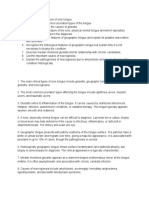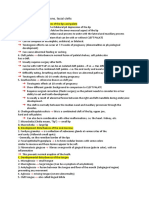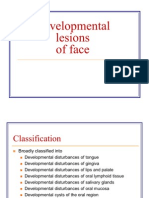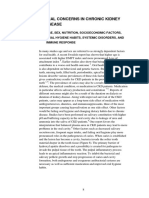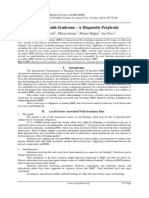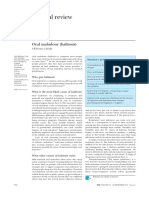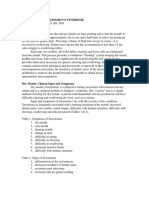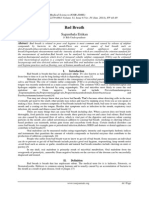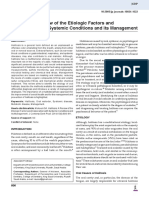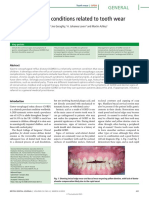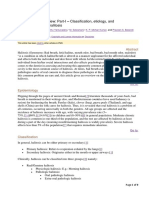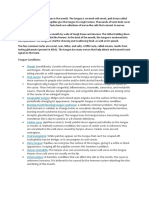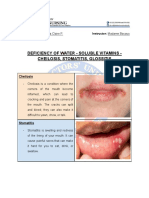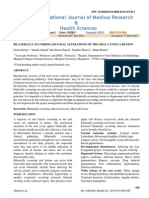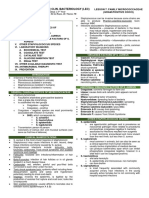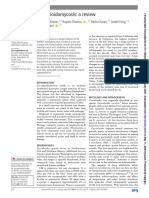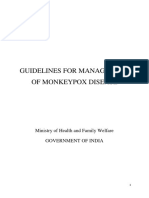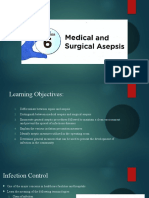Professional Documents
Culture Documents
Atrophic Glossitis
Uploaded by
Falefhi Rizqia DaniOriginal Title
Copyright
Available Formats
Share this document
Did you find this document useful?
Is this content inappropriate?
Report this DocumentCopyright:
Available Formats
Atrophic Glossitis
Uploaded by
Falefhi Rizqia DaniCopyright:
Available Formats
Atrophic glossitis, also known as bald tongue,[2] smooth tongue, Hunter glossitis, Moeller
glossitis, or Mller-Hunter glossitis,[5] is a condition characterized by a smooth glossy tongue
that is often tender/painful,[6] caused by complete atrophy of the lingual papillae
(depapillation).[2] The dorsal tongue surface may be affected totally, or in patches, and may be
associated with a burning sensation, pain and/or erythema.[7] Atrophic glossitis is a non-
specific finding,[7] and has a great many causes, usually related to various nutritional
deficiencies or other factors such as xerostomia (dry mouth) or anemia. Although the terms
Mller and Hunter glossitis were originally used to refer to specifically the glossitis that
occurs in vitamin B12 deficiency secondary to pernicious anemia, they are now used as
synonyms for atrophic glossitis generally.[5] In this article, the term glossitis, unless otherwise
specified, refers to atrophic glossitis.
Candidiasis may be a concurrent finding or an alternative cause of erythema, burning, and
atrophy.
Atrophic glossitis is a condition in which the tongue gets inflamed. The color of swollen
tongue is changed. In atrophic glossitis, the tongue appears smooth and bald. Tiny finger like
structures present on the surface of the tongue called Pappilae are completely lost.
A person who is suffering from atrophic glossitis finds very difficult to eat food, especially
spicy and pungent food, due to loss of taste buds. Atrophic glossitis can affect anyone; mostly
it is a condition of adults. Some of the reasons for its occurrence are vitamin deficiency, iron
deficiency, anemia etc.
What Causes Atrophic Glossitis?
There are several reasons responsible for atrophic tongue. They can be local or systemic
reasons. Certain deficiency is also responsible for tongue inflammation.
Deficiency diseases:
Vitamin B 12 deficiency.
Iron deficiency anemia.
Thiamine deficiency.
Riboflavin deficiency.
Pellagra.
Beriberi.
Local cause of tongue:
Eating very hot food.
Eating spicy and pungent food.
Smoking.
Tongue infection. Poor hygiene and less secretion of saliva in the mouth make an easy
environment for the bacteria to grow on tongue and in the mouth.
Alcoholism.
Allergy to food.
Allergy to toothpaste and mouthwashes.
Plastic in dentures and retainers.
Systemic diseases:
Psoriasis.
drug allergy.
Dehydration.
Lichen planus.
Pemphigus.
Chemotherapy.
Erythema Multiformae.
Atrophic Glossitis Symptoms
A person suffering from atrophic glossitis can be easily detected from the appearance of his
tongue.
Atrophic Glossitis From Vitamin B12 Deficiency: A Case Misdiagnosed
as Burning Mouth Disorder
Julia S. Lehman,* Alison J. Bruce, and Roy S. RogersIII
Abstract
Journal of Periodontology
December 2006, Vol. 77, No. 12, Pages 2090-2092 , DOI 10.1902/jop.2006.060169
(doi:10.1902/jop.2006.060169)
You might also like
- GlossitisDocument7 pagesGlossitisLjubomirErdoglija100% (3)
- LaporDocument9 pagesLaporVictoria HusadaniNo ratings yet
- GlossitisDocument6 pagesGlossitisNurul Absar MamunNo ratings yet
- Fissured Tongue: A Case Report and Review of Literature: KeywordsDocument5 pagesFissured Tongue: A Case Report and Review of Literature: Keywordssiti baiq gadishaNo ratings yet
- Tongue DisordersDocument2 pagesTongue Disordersluke swanepoelNo ratings yet
- Pathophysiology: AglossiaDocument2 pagesPathophysiology: AglossiaDr-AHmad Fasfous AL-QaisiNo ratings yet
- Francis Rossitano Case Objectives Days 4-5: Anatomy/Histology/Physiology (DBCS)Document7 pagesFrancis Rossitano Case Objectives Days 4-5: Anatomy/Histology/Physiology (DBCS)Phil BobNo ratings yet
- Tonguedisorders 150616104030 Lva1 App6892Document34 pagesTonguedisorders 150616104030 Lva1 App6892Mohan VeerabomalaNo ratings yet
- Tinjauan Pustaka 1Document4 pagesTinjauan Pustaka 126 ThufailNo ratings yet
- Tongue Lession PrintDocument9 pagesTongue Lession Printdlami_ahNo ratings yet
- Atrophic Glossitis: Burning Agony of Nutritional Deficiency AnemiaDocument3 pagesAtrophic Glossitis: Burning Agony of Nutritional Deficiency AnemiarestuasNo ratings yet
- Fissure TongueDocument2 pagesFissure Tonguebundahara zoomNo ratings yet
- Drg. Zaiviani Juniani K, MkesDocument33 pagesDrg. Zaiviani Juniani K, MkesdimasahadiantoNo ratings yet
- Geographic TongueDocument5 pagesGeographic Tonguebhawna_aroraNo ratings yet
- Fissured Tongue: A Case Report and Review of Literature: M Rathee, A Hooda, A KumarDocument4 pagesFissured Tongue: A Case Report and Review of Literature: M Rathee, A Hooda, A Kumarade ismailNo ratings yet
- Steroid Inhaler Therapy and Oral Manifestation Similar To Median Rhomboid GlossitisDocument3 pagesSteroid Inhaler Therapy and Oral Manifestation Similar To Median Rhomboid GlossitisRochmahAiNurNo ratings yet
- Oral Medicine - Update For The Dental PractitionerDocument3 pagesOral Medicine - Update For The Dental PractitionerMugiNo ratings yet
- Patology of LinguaDocument37 pagesPatology of LinguaVlad ScutelnicNo ratings yet
- Oral Medicine - Update For The Dental PractitionerDocument8 pagesOral Medicine - Update For The Dental PractitionernavyaNo ratings yet
- Oral Medicine - Update For The Dental Practitioner.: Dry Mouth and Disorders of SalivationDocument5 pagesOral Medicine - Update For The Dental Practitioner.: Dry Mouth and Disorders of SalivationGowriNo ratings yet
- Orofacial Malformations, Facial CleftsDocument2 pagesOrofacial Malformations, Facial CleftsSaman SadeghiNo ratings yet
- Common Tongue DisorderDocument9 pagesCommon Tongue DisorderEdo LiawandiNo ratings yet
- Cleftlipandpalate RemovedDocument9 pagesCleftlipandpalate RemovedWulanRizky AmeliaNo ratings yet
- Oral Frictional HyperkeratosisDocument15 pagesOral Frictional HyperkeratosisFajarRahmantiyoNo ratings yet
- Non Syndromic Bifid TongueDocument1 pageNon Syndromic Bifid TongueFitri AngginiNo ratings yet
- Oral Manifestations of Nuritional Diseases in Children1Document5 pagesOral Manifestations of Nuritional Diseases in Children1andrada67No ratings yet
- Clinical Oral Medicine Lecture NotesDocument3 pagesClinical Oral Medicine Lecture NotesDrMurali G ManoharanNo ratings yet
- Dev Disturbances of Gingiva and TongueDocument77 pagesDev Disturbances of Gingiva and TongueNavyy DentNo ratings yet
- Ilovepdf MergedDocument7 pagesIlovepdf MergedNoval BalanceNo ratings yet
- Burning Mouth Syndrome - A Diagnostic PerplexityDocument3 pagesBurning Mouth Syndrome - A Diagnostic PerplexityInternational Organization of Scientific Research (IOSR)No ratings yet
- Oral Medicine - Update For The Dental PractitionerDocument3 pagesOral Medicine - Update For The Dental PractitionerGowriNo ratings yet
- 08 Oral ManifestationDocument7 pages08 Oral ManifestationFachri MubarokNo ratings yet
- Oral Manifestations of Systemic Disease: Autoimmune DiseasesDocument7 pagesOral Manifestations of Systemic Disease: Autoimmune DiseaseshussainNo ratings yet
- Clinical Review: Oral Malodour (Halitosis)Document4 pagesClinical Review: Oral Malodour (Halitosis)Maghfira TiechaNo ratings yet
- Ibtisam Al-Hashimi, BDS, MS, PHD: Oral Aspects of Sjogren'S SyndromeDocument2 pagesIbtisam Al-Hashimi, BDS, MS, PHD: Oral Aspects of Sjogren'S SyndromeShree ElangovanNo ratings yet
- Oral Medicine - Update For The Dental Practitioner.: Dry Mouth and Disorders of SalivationDocument5 pagesOral Medicine - Update For The Dental Practitioner.: Dry Mouth and Disorders of SalivationMugiNo ratings yet
- Bad BreathDocument6 pagesBad BreathInternational Organization of Scientific Research (IOSR)No ratings yet
- Awareness of Oral Manifestations Related To Systemic DiseasesDocument5 pagesAwareness of Oral Manifestations Related To Systemic DiseasesInternational Journal of Innovative Science and Research TechnologyNo ratings yet
- Prev Next: Tongue ConditionsDocument4 pagesPrev Next: Tongue ConditionsVictor PatinoNo ratings yet
- Diseases of Oral CavityDocument60 pagesDiseases of Oral Cavityfredrick damian80% (5)
- Oral DiseasesDocument4 pagesOral DiseasesAlphonse ElricNo ratings yet
- Prezentare Microsoft PowerPoint NouDocument7 pagesPrezentare Microsoft PowerPoint NouIna VetrilaNo ratings yet
- Developmental Disturbances of The JawsDocument52 pagesDevelopmental Disturbances of The JawsMaydis stigmaNo ratings yet
- Halitosis: A Review of The Etiologic Factors and Association With Systemic Conditions and Its ManagementDocument6 pagesHalitosis: A Review of The Etiologic Factors and Association With Systemic Conditions and Its ManagementNadya PuspitaNo ratings yet
- Gastrointestinal Conditions Related To Tooth Wear: GeneralDocument4 pagesGastrointestinal Conditions Related To Tooth Wear: Generalfdeetny webassNo ratings yet
- Halitosis - An Overview: Part-I - Classification, Etiology, and Pathophysiology of HalitosisDocument9 pagesHalitosis - An Overview: Part-I - Classification, Etiology, and Pathophysiology of Halitosisdevi hambarwatiNo ratings yet
- 7 Oral Health of Geriatric People Modified Copy or ReferenceDocument15 pages7 Oral Health of Geriatric People Modified Copy or ReferenceNitya KrishnaNo ratings yet
- Tongue Diseases NDocument46 pagesTongue Diseases NhazeemmegahedNo ratings yet
- By Dr. Smitha B K Post Graduate Student Department of Preventive and Community DentistryDocument58 pagesBy Dr. Smitha B K Post Graduate Student Department of Preventive and Community DentistryAnnupriya KhannaNo ratings yet
- TODENTJ 10 619 CompressedDocument17 pagesTODENTJ 10 619 CompressedAisyah Arina NurhafizahNo ratings yet
- Bahan DressingDocument17 pagesBahan DressingRinanda YuliaNo ratings yet
- Tongue Conditions: ThrushDocument3 pagesTongue Conditions: Thrushdwi vaniNo ratings yet
- Oral Medicine Journal Reading (Complete)Document29 pagesOral Medicine Journal Reading (Complete)Gabriel LowNo ratings yet
- A Patient With Dry Mouth PDFDocument6 pagesA Patient With Dry Mouth PDFWahdatNo ratings yet
- Defficiency of Water - Soluble Vitamins - Cheilosis, Stomatitis, GlossitisDocument2 pagesDefficiency of Water - Soluble Vitamins - Cheilosis, Stomatitis, GlossitisAlyssa Claire TumulakNo ratings yet
- Tongue in Disease and Remedial Diagnosis - Science-Based HomeopathyDocument7 pagesTongue in Disease and Remedial Diagnosis - Science-Based HomeopathyTakpire DrMadhukar100% (1)
- 39 Ahmed EtalDocument6 pages39 Ahmed EtaleditorijmrhsNo ratings yet
- 53 Article XerosDocument5 pages53 Article XerosNivehthaa VisvamNo ratings yet
- Variasi Normal Rongga MulutDocument18 pagesVariasi Normal Rongga MulutRafi Kusuma Ramdhan SukonoNo ratings yet
- Treatment Sti What'S The Story With These Stis?: Protect Yourself!Document2 pagesTreatment Sti What'S The Story With These Stis?: Protect Yourself!fuck youNo ratings yet
- PIDSR VPD SurveillanceDocument89 pagesPIDSR VPD SurveillanceMichelle TuraNo ratings yet
- CarcinosinumDocument8 pagesCarcinosinumpanniyin selvanNo ratings yet
- Epidemiology An IntroductionDocument284 pagesEpidemiology An IntroductionJoshua OluwayomiNo ratings yet
- Petersen 2001Document30 pagesPetersen 2001Bianca MagnelliNo ratings yet
- Case StudyDocument7 pagesCase StudyElizabeth DaligdigNo ratings yet
- Causes and Risk Factors of Stis: Sexually Transmitted Diseases GuideDocument12 pagesCauses and Risk Factors of Stis: Sexually Transmitted Diseases GuideCabiomilaNo ratings yet
- 10 Atypical PneumoniaDocument4 pages10 Atypical PneumoniaKevinTevesYupanquiNo ratings yet
- Skitchy MicroDocument190 pagesSkitchy MicrohaneenNo ratings yet
- (Early Modern History - Society and Culture) Laura J. McGough (Auth.) - Gender, Sexuality, and Syphilis in Early Modern Venice - The Disease That Came To Stay-Palgrave Macmillan UK (2010) - 4 PDFDocument213 pages(Early Modern History - Society and Culture) Laura J. McGough (Auth.) - Gender, Sexuality, and Syphilis in Early Modern Venice - The Disease That Came To Stay-Palgrave Macmillan UK (2010) - 4 PDFMarianaNo ratings yet
- Group 6 Fungi and Protozoa Activity 1Document2 pagesGroup 6 Fungi and Protozoa Activity 1严子明 Renz Ryan SevillenoNo ratings yet
- 7 Family Micrococcaceae PDFDocument5 pages7 Family Micrococcaceae PDFAnne MorenoNo ratings yet
- Pericardita InfectioasaDocument4 pagesPericardita InfectioasaMihai SebastianNo ratings yet
- Prevalence, Types and Treatment of Tuberculosis: A ReviewDocument25 pagesPrevalence, Types and Treatment of Tuberculosis: A ReviewUMT JournalsNo ratings yet
- Annex General Medical CertificateDocument1 pageAnnex General Medical CertificateNicole AranaNo ratings yet
- Cefu, Metro, KetoDocument4 pagesCefu, Metro, KetoSethlyn_Gomez_5337No ratings yet
- Coccidioidomycosis A ReviewDocument9 pagesCoccidioidomycosis A ReviewafamhbkNo ratings yet
- English Super 20 Sample Papers Term 2 Class 12 WWW - EXAMSAKHA.IN PDFDocument54 pagesEnglish Super 20 Sample Papers Term 2 Class 12 WWW - EXAMSAKHA.IN PDFSUBIR BASUNo ratings yet
- Rabies CaseDocument3 pagesRabies CaseanastasiaNo ratings yet
- Guidelines For Management of Monkeypox DiseaseDocument23 pagesGuidelines For Management of Monkeypox DiseaseMinerva Medical Treatment Pvt LtdNo ratings yet
- Chapter 06. Medical and Surgical AsepsisDocument19 pagesChapter 06. Medical and Surgical AsepsisChino Isiah CañeteNo ratings yet
- Mosquito Borne DiseasesDocument24 pagesMosquito Borne DiseasesSidney BowenNo ratings yet
- Antibacterial and Antibiofilm Potential of Ethanolic Extract From Bintaro Flower (Cerbera Odollam) Against StaphylococcusDocument4 pagesAntibacterial and Antibiofilm Potential of Ethanolic Extract From Bintaro Flower (Cerbera Odollam) Against Staphylococcusdwisl95No ratings yet
- Discuss The Major Health Problems in IndiaDocument4 pagesDiscuss The Major Health Problems in Indianaresh BNo ratings yet
- Otitis MediaDocument18 pagesOtitis MediatanmayatechtubeNo ratings yet
- Fiitjee: Admission Test-2021Document23 pagesFiitjee: Admission Test-2021Manicks VelanNo ratings yet
- Methicillin-Resistant Staphylococcus Aureus (MRSA) in Adults - Treatment of Skin and Soft Tissue Infections - UpToDateDocument22 pagesMethicillin-Resistant Staphylococcus Aureus (MRSA) in Adults - Treatment of Skin and Soft Tissue Infections - UpToDateSiddhartha PalaciosNo ratings yet
- ngrobler,+SAJS+116 9-10 Kashangura+Scientific+Correspondence ApprovedDocument2 pagesngrobler,+SAJS+116 9-10 Kashangura+Scientific+Correspondence ApprovedSantiago GomezNo ratings yet
- CH 12 Bio Allen NsejsDocument17 pagesCH 12 Bio Allen NsejsddNo ratings yet
- National Leprosy Eradication ProgrammeDocument4 pagesNational Leprosy Eradication ProgrammeSaiyan VegetaNo ratings yet





